Copyright © 2026 lpcentre.com All Rights Reserved. London Premier Centre For Training Ltd Registered in England and Wales, Company Number: 13694538
version: 3.0.1

Posted on : 11/28/2022, 9:16:14 PM
Last Update : 11/18/2024, 4:08:58 AM
Recently, the demand for oil and gas courses has surged significantly. As a vast and complex sector, the oil and gas industry requires a strong foundational understanding, especially when it comes to understanding the integration and variation in technical methods that drive the sector forward.
Oil and gas courses are an effective way to enhance your expertise, build practical competencies, and establish a solid career foundation with internationally recognized certificates and degrees. These training programs cover a variety of aspects in the energy sector, preparing you for a successful future with expertise in health and safety at various levels.
In this guide, we will explore the top 4 oil and gas courses offered online in Malaysia, structured to provide a wide range of options to help you advance virtually in this dynamic field within just a few days.
This targeted online training program, one of the most advanced in oil and gas project management, equips participants with a structured approach to managing project risks, ensuring value protection, and minimizing potential disruptions. Led by specialists in the energy sector, the project risk management in the oil and gas industry training course addresses the core aspects of business, operational, and project risk, while incorporating safety as a key consideration in risk management processes.
Moreover, in this oil and gas courses training, candidates will learn how to plan effectively and apply techniques tailored to oil and gas projects at every level within a company or organization-opening up opportunities for jobs in energy project management.
To excel in the field, specialists need a thorough understanding of extraction, distribution, and processing mechanisms. Oil and gas short courses in Malaysia offer insights into industry essentials, from exploration and extraction to transportation.
The Oil and Gas Industry Fundamentals training is scheduled to provide participants a comprehensive overview of these operations, focusing on engineering concepts such as offshore production, piping systems, and distribution, with an emphasis on safety measures and best practices in the industry. Online classes of oil and gas courses are structured to familiarize participants with professional terminology, recent advancements in exploration, drilling, and the handling of natural resources, making them proficient professionals in the industry.

For those aiming to strengthen their business management skills in this sector, these oil and gas courses provide a broad knowledge base. Technical managers and industry specialists will gain a deep understanding of petroleum definitions, refining operations, and the global dynamics involving major petroleum companies.
The international oil and gas business management fundamentals training is designed to focus on oil and gas exploration and upstream markets, teaching specific procedures and compliance requirements in an online format for easier access. It is structured to refine decision-making capabilities and strategic insights for success by providing expert training on various types of business management strategies in these critical industries.
Among fundamental oil and gas courses, this training course covers important topics such as ISA requirements and targeted audit risk areas relevant to the audit of financial statements of oil and gas companies.
Mastering Auditing in Oil and Gas Industry training focuses on the correct application of international auditing standards, accounting principles, and common audit issues that occur regularly in practice. The online training course offers participants and students an understanding of the audit process, delivering insights into the technology and practices applied in audit activities carried out in the oil and gas industry through focused study. It also emphasizes continuing education to ensure auditors understand the evolving requirements and challenges in this sector.
The oil and gas courses we mentioned are only a small part of several other popular training sessions. These courses offer specialized learning and development, covering multiple levels and taught by leading experts in the sector. Some courses are live and attended online, with others offering flexible scheduling. Participants will receive an internationally recognized certified diploma or certificate accredited by top academic centers when they complete any course, often within a week.
Therefore, do not miss the opportunity to invest your time in these essential oil and gas courses and discover the best solutions for advancing in this industry.